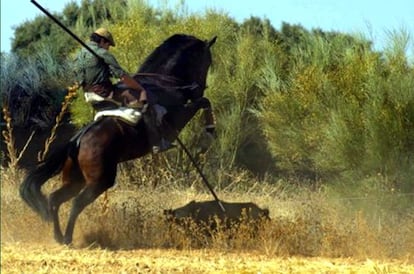Animal rights activists fume as wild boar hunters ride again
Castilla-La Mancha to amend rules to accommodate comeback of "pigsticking"

Hunting wild boars on horseback with a spear - an ancient tradition that was practically extinct - is making a comeback in parts of Spain.
Despite criticism from environmentalists and animal rights activists, the regional government of Castilla-La Mancha is planning to take the final legislative step that will modify existing hunting rules to accommodate a new category of blood sport, "spearing boars on horseback, which is being demanded by hunters."
Although it is not yet legally encoded, several hunting grounds have been offering the possibility of spearing wild boar for some time. Practitioners claim that historic records of this tradition go back centuries. But the green group Ecologists in Action considers it "a bloody, savage practice worthy of barbarians."
Enrique del Águila is the founder of the Club Internacional de Lanceo, or the Pigsticking International Club, according to the English version of the website, which describes the group as "a gentlemen's club, which organizes hoghunting for our customers."
The practice was nearly forgotten, but it was being done across Spain"
"The practice was nearly forgotten, but it was being done across much of Spain," he explains. "There are vestiges from the first century BC and we also know that King Alphonse X the Wise and Philip II did it."
Pigsticking was long practiced in India, and became popular with British officers stationed there during the Empire period, according to the Tribune India newspaper.
Around three years ago, after trying it at a Madrid estate, Del Águila decided to make a business of the pursuit. Now he attracts hunters from Madrid and releases wild boars into a 50-hectare estate. Spearmen ride out in groups after the animal, and "the first one to draw blood keeps it." The hog, Del Águila notes, has a chance to escape, but in the end the quarry must be hunted down and finished off. The basic price for four spearmen is 5,000 euros, and each year 30 to 50 boars get hunted at his club.
It is a bloody, savage practice worthy of barbarians"
Del Águila got in touch with the government of Castilla-La Mancha to make the practice legal, and he is about to see his wish granted. On May 16, the regional hunting council discussed the draft reform that will include this form of hunting, described as "covering land on horseback with riders hunting boars with a spear." The original text used the word "hounding," but it was struck from the document "to avoid ethical conflicts." This newspaper unsuccessfully attempted to obtain the regional government's view on the matter.
Juan Carlos Atienza, of the environmental group SEO/Birdlife, was on the hunting council and said it was "unconscionable that a rule should be modified to serve the interests of one or two people, no matter how important they may be." He also said that authorizing hunting styles such as this was "a setback for all hunters and hunting managers who work to preserve the environment." The proposal will be analyzed by the Advisory Council on the Environment, the last government body to have a say in the reform.
"The Administration was very good about it because it was a business opportunity," says Del Águila, who feels it is normal for regulation to come after the fact. After all, it is not just his own estate that offers pigsticking on horseback. Places in Toledo, Madrid and Castilla y León also offer the practice. And down in Hinojos, in Huelva province, every summer when the wetlands of Doñana go dry, there are one or two hunting expeditions for local villagers. Antonio Gil, a former mayor, says this is done to keep the boar population in check, as it is an omnivorous animal that can cause significant damage.
"We've done it here ever since anyone can remember. There is no economic interest behind it, just cultural and recreational."
Miguel Ángel Hernández, chief of conservation for Ecologists in Action, notes that Castilla-La Mancha has a powerful hunting industry that "always sets the pace for the rest of the regions." He also underscores that hunting is a regulated activity and that "you can't go around killing animals any way you want to." He criticizes boar lancing in Doñana, but considers it much worse for the practice to be making a comeback in Toledo, where it was practically forgotten.
Luis Fernando Villanueva, director of the hunting association Aproca, says he doubts pigsticking will ever move beyond "15 or 20 hunting grounds in Toledo and Ciudad Real". Regarding animal suffering, he said that "there are other forms in which [the animal] can suffer, too."







































